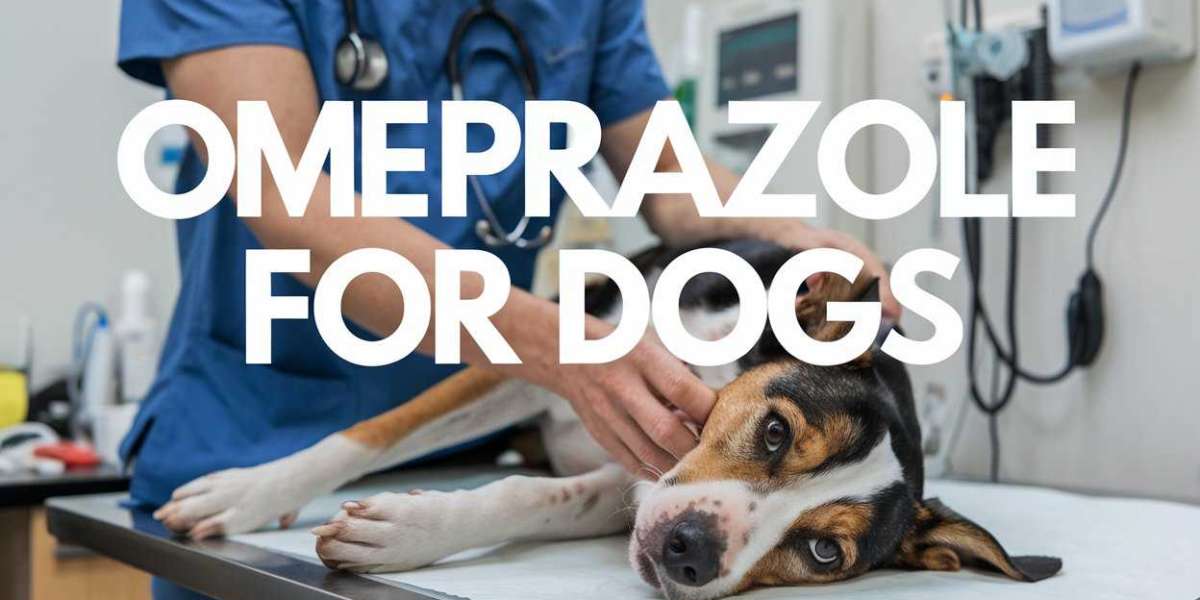As dog owners, ensuring our pets’ health and well-being is always a top priority. When dogs suffer from gastrointestinal issues such as acid reflux or stomach ulcers, medications like Omeprazole are commonly prescribed to help manage these conditions. In this guide, we’ll break down what Omeprazole is, how it works, its uses in veterinary medicine, dosing guidelines, potential side effects, and when to consult your vet.
What is Omeprazole?
Omeprazole is a proton pump inhibitor (PPI) that reduces the production of stomach acid. It is commonly used in both humans and animals to treat conditions like acid reflux, heartburn, and ulcers. By lowering the amount of acid the stomach produces, Omeprazole helps to prevent and heal damage to the stomach lining and esophagus.

While Omeprazole is not officially FDA-approved for veterinary use, it is commonly prescribed by veterinarians as an off-label medication for dogs with gastrointestinal issues.
How Does Omeprazole Work in Dogs?
Omeprazole works by targeting the proton pumps in the stomach lining that are responsible for producing acid. By inhibiting these pumps, the medication significantly decreases acid production, providing relief from conditions like gastroesophageal reflux disease (GERD), stomach ulcers, and gastritis.
Dogs that produce excessive stomach acid may develop ulcers, which can be painful and dangerous. Omeprazole helps manage this by reducing acid levels and allowing the affected tissues to heal.
Common Uses of Omeprazole in Dogs
Omeprazole is typically used in veterinary medicine for conditions involving excessive stomach acid. Here are the most common conditions where this medication is beneficial:
Gastroesophageal Reflux Disease (GERD): Dogs with GERD experience the backflow of stomach acid into the esophagus, leading to discomfort, irritation, and potential long-term damage. Omeprazole can reduce acid levels and help manage this condition.
Stomach and Intestinal Ulcers: Ulcers can develop in dogs due to various reasons, including stress, the use of non-steroidal anti-inflammatory drugs (NSAIDs), or other underlying health conditions. Omeprazole reduces acid production, giving the ulcers time to heal.
Gastritis: Inflammation of the stomach lining, or gastritis, can occur in dogs and lead to vomiting, loss of appetite, and abdominal pain. By reducing stomach acid, Omeprazole can relieve these symptoms and help heal the stomach lining.
Esophagitis: Inflammation of the esophagus can also be managed by reducing stomach acid levels with Omeprazole.
Dosage Guidelines for Omeprazole in Dogs
The appropriate dosage of Omeprazole for your dog will depend on their size, weight, and specific condition. Generally, the typical dosage is around 0.25-1 mg per pound of body weight, given once daily. However, it’s essential to follow your veterinarian’s guidance regarding dosage, as they may adjust it based on your dog’s particular needs.
For example, a 20-pound dog may be prescribed 5 to 20 mg of Omeprazole per day, while a larger dog may require a higher dose. Omeprazole is usually administered orally in the form of tablets, capsules, or even a liquid suspension for smaller dogs.
It’s crucial to give Omeprazole at the same time each day and follow the veterinarian's instructions regarding food restrictions, as some dogs may need to take the medication on an empty stomach.
Potential Side Effects of Omeprazole in Dogs
While Omeprazole is generally safe for dogs, as with any medication, there can be side effects. Most dogs tolerate it well, but potential side effects may include:
- Diarrhea or constipation
- Loss of appetite
- Nausea or vomiting
- Flatulence (excessive gas)
- Lethargy
- Allergic reactions (very rare)
If you notice any severe or concerning side effects, contact your veterinarian immediately. Although side effects are uncommon, it’s essential to monitor your dog closely, especially when starting a new medication.
Special Considerations
Pregnant or Lactating Dogs: Always inform your vet if your dog is pregnant or lactating before starting Omeprazole. While it’s generally considered safe, your vet may choose to prescribe alternative medications based on your dog's condition.
Dogs on Other Medications: Omeprazole may interact with other medications your dog is taking, such as antacids or NSAIDs. Make sure to inform your vet about all medications and supplements your dog is on to avoid adverse reactions.
Chronic Conditions: If your dog has any chronic conditions like liver or kidney disease, make sure your vet is aware, as this may affect how Omeprazole is processed by their body.
When to Consult Your Veterinarian
While Omeprazole can be highly effective in treating gastrointestinal issues, it’s essential not to self-prescribe this medication. Always consult your veterinarian if you notice any of the following symptoms in your dog:
- Frequent vomiting or regurgitation
- Excessive drooling
- Signs of stomach pain or discomfort (whining, reluctance to lie down)
- Black or tarry stools (a sign of internal bleeding)
These signs could indicate serious gastrointestinal issues requiring professional evaluation and treatment.
Conclusion
Omeprazole is a valuable tool in managing gastrointestinal conditions in dogs. By reducing stomach acid production, it provides relief from conditions like acid reflux, ulcers, and gastritis. However, it is crucial to use this medication under the guidance of a veterinarian to ensure the correct dosage and monitor any potential side effects.
If your dog is showing signs of gastrointestinal distress, consult your vet for a thorough evaluation and treatment plan, which may include Omeprazole as part of their recovery journey. Proper care and attention will help ensure your furry friend stays healthy and comfortable! Read more













